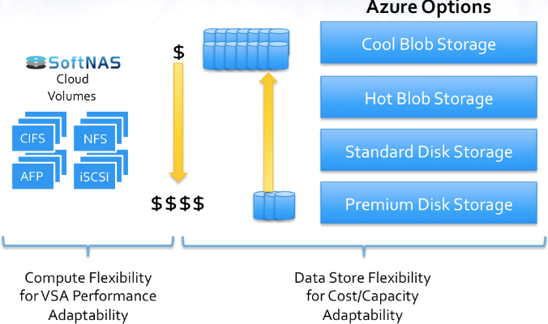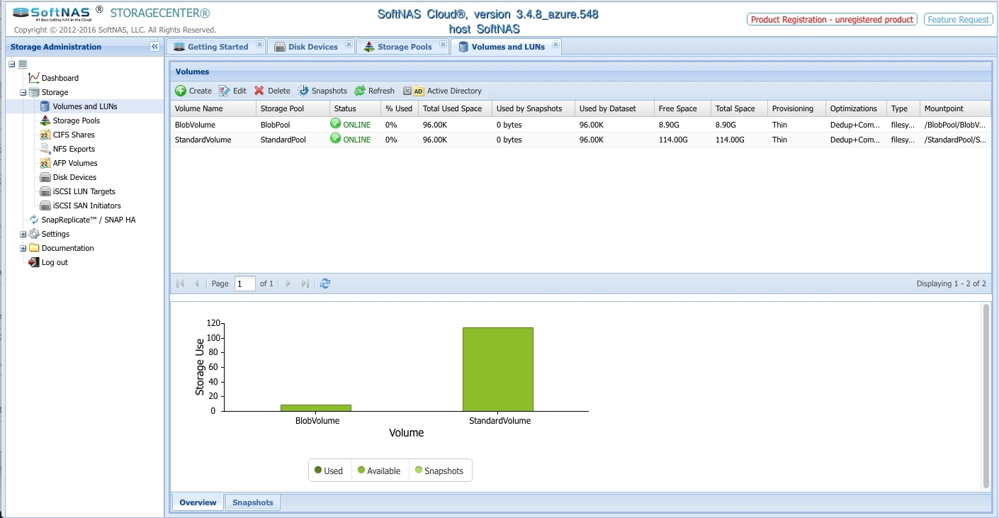SoftNAS Cloud Expanded on Microsoft Azure
Move petabytes to Azure without re-architecting applications
This is a Press Release edited by StorageNewsletter.com on October 28, 2016 at 2:35 pmSoftNAS, Inc. announced SoftNAS Cloud that utilizes the spectrum of data stores available from the Microsoft Azure cloud platform ranging from performance SSD-based to Azure Cool Blob storage.
Azure customers using SoftNAS Cloud can achieve both petabyte scale file storage and the combination of cost, scale, data protection and HA.
Customers can move their large-scale workloads to Azure with confidence and free themselves of the expense and complexity of traditional on-premises NAS and SAN appliances. Azure provides customers the flexibility to tune capacity and performance as needs change. Customers desiring an opex)model pay only for services used with the ability to scale to petabytes with SoftNAS Cloud. Using it on Azure, customers preserve compatibility with file-based applications, freeing budget for use on other important digital modernization projects that offer high business value. Customers achieve security and control because SoftNAS Cloud allows HA with automatic failover and data access.
“Transitioning to cloud storage can be a challenge for enterprise customers, because many legacy applications aren’t designed to natively support object-based storage,” said Steven Hill, senior analyst, storage, 451 Group. “SoftNAS’ platform provides customers with familiar, file-based services using the Microsoft Azure object storage backend, offering the flexibility and economy of cloud storage while reducing the need for costly, on-premises hardware.”
“SoftNAS Cloud resonates with enterprise customers that want to migrate data and applications to Azure,” commented Jeff Kato, senior analyst, Taneja Group. “SoftNAS Cloud provides the same on-premises, enterprise NAS functionality in the cloud, which means customers do not have to re-engineer applications when moving to the Azure cloud, saving time and money.“
“Microsoft Azure is dominant in the enterprise because it offers a flexible storage architecture. SoftNAS Cloud is dominant in the enterprise because SoftNAS Cloud provides scalability to petabytes, 360-degree data protection, and HA with no proprietary storage, hardware, or OS,” said Rick Braddy, CEO and CTO, SoftNAS. “SoftNAS Cloud allows customers using Azure to harness the inherent scale out ability of cloud-based storage systems.“
“Microsoft Azure provides massively scalable cloud storage. The availability of SoftNAS on Azure gives our mutual customers access to enterprise-grade cloud-based storage with more flexibility and choice, in a highly secure and compliant cloud,” said Venkat Gattamneni, director, product marketing, Microsoft Azure, Microsoft Corp.
Click to enlarge
SoftNAS Cloud customers can adjust storage performance, protection, and capacity at any time to suit changing workload demands, unlike physical storage hardware appliances whose compute and storage capacities take days or weeks to adjust. This release of SoftNAS Cloud leverages Azure Hot Blob and Azure Cool Blob storage to present NFS, CIFS/SMB with Active Directory integration, iSCSI and AFP targets. This version also supports Azure General-purpose and Azure Premium Storage types.
Enterprise SoftNAS Cloud features include deduplication, compression, storage snapshots, replication, thick and thin provisioning, and encryption in flight and at rest. Use cases include:
-
CIFS/SMB and NFS file services, and iSCSI block storage
-
General purpose file storage
-
Storage for off-site archive, backups and data archival instead of tape
-
Cloud migration – from private to public clouds
-
Block replication to/from other clouds
-
User file home directories
-
Unstructured data repository for application hosting
-
Video/media storage and sharing
-
SaaS-enable legacy applications without converting to an object architecture
-
DevOps build/test environments
-
Enterprise source code control
SoftNAS Cloud free 30-day trial














 Subscribe to our free daily newsletter
Subscribe to our free daily newsletter
